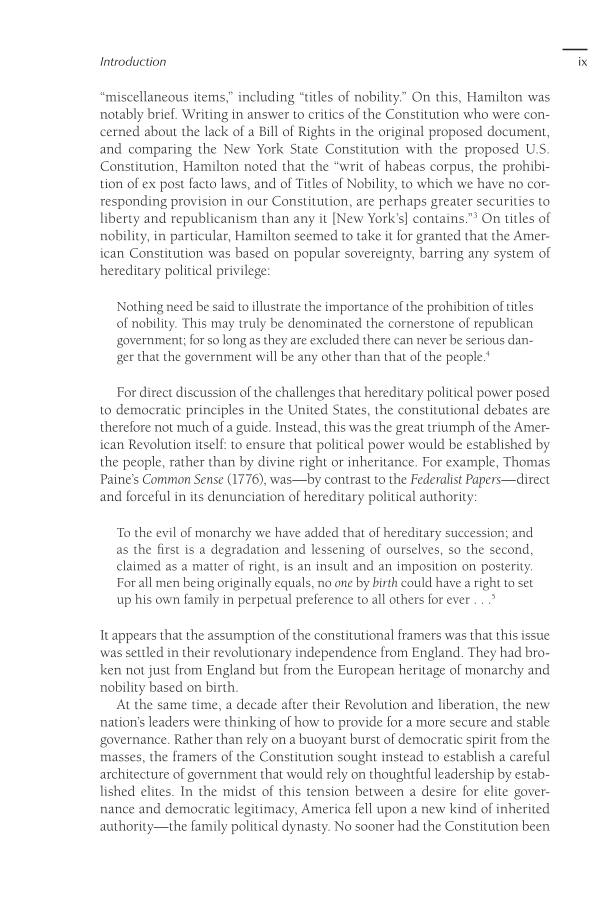Introduction ix “miscellaneous items,” including “titles of nobility.” On this, Hamilton was notably brief. Writing in answer to critics of the Constitution who were con- cerned about the lack of a Bill of Rights in the original proposed document, and comparing the New York State Constitution with the proposed U.S. Constitution, Hamilton noted that the “writ of habeas corpus, the prohibi- tion of ex post facto laws, and of Titles of Nobility, to which we have no cor- responding provision in our Constitution, are perhaps greater securities to liberty and republicanism than any it [New York’s] contains.”3 On titles of nobility, in particular, Hamilton seemed to take it for granted that the Amer- ican Constitution was based on popular sovereignty, barring any system of hereditary political privilege: Nothing need be said to illustrate the importance of the prohibition of titles of nobility. This may truly be denominated the cornerstone of republican government for so long as they are excluded there can never be serious dan- ger that the government will be any other than that of the people.4 For direct discussion of the challenges that hereditary political power posed to democratic principles in the United States, the constitutional debates are therefore not much of a guide. Instead, this was the great triumph of the Amer- ican Revolution itself: to ensure that political power would be established by the people, rather than by divine right or inheritance. For example, Thomas Paine’s Common Sense (1776), was—by contrast to the Federalist Papers—direct and forceful in its denunciation of hereditary political authority: To the evil of monarchy we have added that of hereditary succession and as the first is a degradation and lessening of ourselves, so the second, claimed as a matter of right, is an insult and an imposition on posterity. For all men being originally equals, no one by birth could have a right to set up his own family in perpetual preference to all others for ever . . .5 It appears that the assumption of the constitutional framers was that this issue was settled in their revolutionary independence from England. They had bro- ken not just from England but from the European heritage of monarchy and nobility based on birth. At the same time, a decade after their Revolution and liberation, the new nation’s leaders were thinking of how to provide for a more secure and stable governance. Rather than rely on a buoyant burst of democratic spirit from the masses, the framers of the Constitution sought instead to establish a careful architecture of government that would rely on thoughtful leadership by estab- lished elites. In the midst of this tension between a desire for elite gover- nance and democratic legitimacy, America fell upon a new kind of inherited authority—the family political dynasty. No sooner had the Constitution been
Document Details My Account Print multiple pages
Print
You have printed 0 times in the last 24 hours.
Your print count will reset on at .
You may print 0 more time(s) before then.
You may print a maximum of 0 pages at a time.

































































































































































































































































































































































































